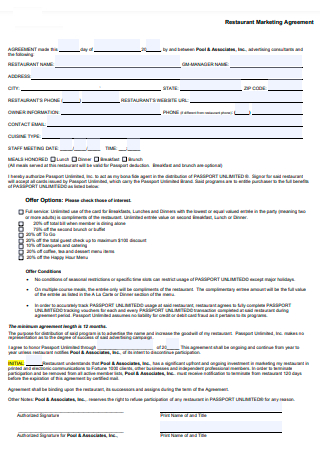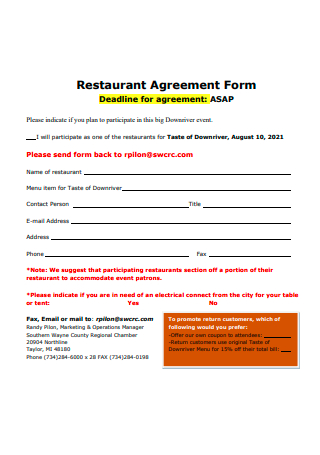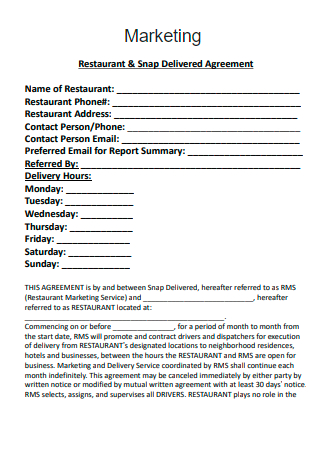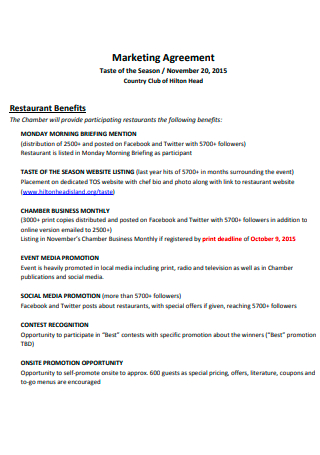3+ Sample Restaurant Marketing Agreement
FREE Restaurant Marketing Agreement s to Download
3+ Sample Restaurant Marketing Agreement
What Is a Restaurant Marketing Agreement?
Importance of Marketing for a Restaurant
Structuring Marketing Agreements
How to Write a Restaurant Marketing Agreement
FAQs
What does a restaurant marketer do?
What is promotion?
What is restaurant online marketing?
What Is a Restaurant Marketing Agreement?
Restaurant marketing agreements are legal papers that lay out the parties engaged, the scope of work, the fees for services delivered, and other details. Such agreements are critical tools for both parties since they clarify the goal and terms of the arrangement, instilling trust in the project and improving the working relationship. It coincides with a marketing plan since both parties aim for the restaurant to improve in its state of drawing in more customers. Don’t worry because this article will help you through the process. Furthermore, you won’t have to start from scratch with the restaurant marketing agreement template available.
Importance of Marketing for a Restaurant
Your restaurant is unlikely to thrive without marketing. Marketing can bring customers and patrons to your door day after day of operation with smart strategies and execution. Marketing can help you build a positive reputation and reach out to customers who would otherwise be unaware of your existence. It also aids restaurant promotions such as new menu item announcements, discounts, and special events to be more known to the public so they are further drawn into your restaurant.
Structuring Marketing Agreements
You can hire a full-service marketing consultancy if you don’t have the time or resources to handle all of your advertising, public relations, and promotions. Prepare a marketing agreement or contract before beginning the relationship that specifies the scope of the job to be done as well as the length of time it will last. All contract partners’ responsibilities and expectations should be included in marketing agreements.
How to Write a Restaurant Marketing Agreement
Writing a restaurant marketing agreement is the next step you will finally venture into after going through the curated lists prepared for you. You may have headed straight to this part and is more than okay if you are already aware of the items found above. Moving on, you can also utilize the available restaurant marketing agreement example as an additional reference. You have to make sure you don’t forget any of the important marketing agreement clauses otherwise it could be troubling to make changes in the future. You can also think of it as a marketing agreement checklist.
Step 1: State the Names and Addresses
As this is the first section that is read, it is important to notify the reader regarding who this document is arranged with. Although this may seem obvious, many agreement templates just utilize boilerplates that never describe the customer. Every time, you must state who the agreement is between. In addition, both parties’ legal names and addresses must be given.
Step 2: Duration of the Agreement
This section describes the official start of the restaurant marketing agreement and when or how it would officially end. For certain projects, it could be hard to set a definitive end date. A rough estimate may do but you could also define it further in the scope of work to give an idea. You should also consider charging an extra amount for an extension or non-date-specific arrangements, especially if the added tasks would take a strenuous amount of your time.
Step 3: Scope of Work
Scope of work will define what you are up to as an agreement. To avoid misunderstandings for both your staff and your clients, it’s critical to go extremely detailed. When it comes to things such as restaurant marketing, particular figures should be defined. Avoid using industry jargon. Some people may believe that a brand identity includes some sort of format, while others may completely invent expectations. If it is a brand identity project, be sure to spell out the deliverables. A logo, type stack, color palette, business card, and a small style guide are often what is expected.
Step 4: Contract Terms and Termination`
This section of the restaurant marketing agreement specifies how long the agreement will be in effect, as well as the terms and conditions of marketing responsibilities and how each party might terminate the agreement. Since it outlines the contract’s execution, this is one of the most crucial components of a marketing agreement. A corporation signing into a marketing deal with a public relations agency, for example, may stipulate that content be approved only after approval by the marketing department. Before terminating the agreement, the agency may ask the corporation to give 30 days’ notice.
Step 5: Fees and Compensation
A restaurant marketing agreement specifies what one party has requested and how those wishes will be fulfilled through services. The contract specifies the scope of the work to be done, how one party will be compensated for the requested work, and how additional fees may be applied to the contract if the scope of the work exceeds the scope of the contract’s initial agreement. The agreement may also state if the marketing company or consultant prefers to be paid by check, cash, or some other method, as well as when payments are due.
Step 6: Confidentiality and Intellectual Property
Client data, passwords, and confidential information must all be kept secure under most marketing agreements. This section of the contract outlines how the marketing service provider will protect sensitive information to avoid competitive risk and other potentially detrimental disclosure. After the agreement expires, the agreement states who owns what. It is important to uphold confidentiality since it can lead to legal charges if unhandled well.
FAQs
What does a restaurant marketer do?
Advertisements, public relations, promotions, and social media campaigns are all created by restaurant marketers. This includes developing advertisements and finding the best media to use for their distribution. It will necessitate the usage of social media to obtain testimonials and referrals. The different types of marketing they could utilize are relationship marketing, print media marketing, signage, and promotional marketing, digital pay-per-click marketing, community and content marketing, and direct marketing.
What is promotion?
Promotion is a marketing tool that is utilized as a communication method between vendors and purchasers. The merchant is attempting to persuade and persuade buyers to purchase their products or services by doing so. It aids in the dissemination of information about the product, service, or company to the general public. This method is used by the corporation to boost its public image. Consumers’ brains are piqued by this marketing tactic, and they are more likely to remain loyal customers.
What is restaurant online marketing?
Digital marketing for restaurants, also known as online marketing for restaurants, is establishing a restaurant’s brand presence through digital channels such as Facebook, Twitter, and the website. In the digital age, utilizing social media and other online platforms will be an advantage because you do less of the work while reaching the same goal as traditional means of marketing. A purchase agreement may come into play if you avail of paid ads online.
This officially ends the article which marks you are more than ready to begin writing a restaurant marketing agreement that would surely improve the state of your restaurant. Though if you feel as if your business marketing agreement lacks something, you can look into a marketing strategy. What are you waiting for? Make a restaurant marketing agreement now and gather more customers for your business!




